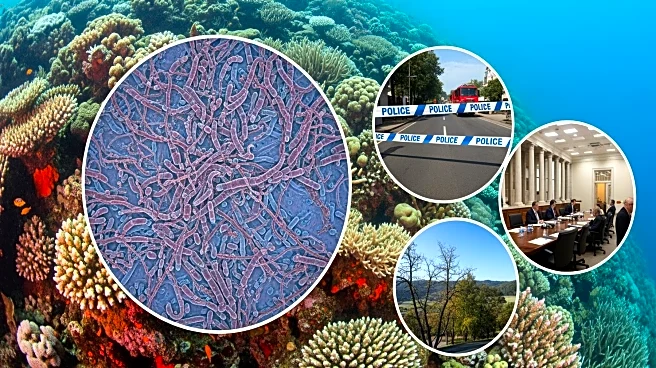What's Happening?
An international team of microbiologists, led by Marc Mussmann and Alexander Loy at the University of Vienna, has identified a new type of microbial metabolism involving MISO bacteria. These microorganisms can 'breathe' iron minerals by oxidizing toxic
sulfide, a process previously thought to be purely chemical. The discovery reveals that MISO bacteria use this reaction for energy, potentially playing a crucial role in preventing the expansion of oxygen-depleted 'dead zones' in aquatic ecosystems. The findings, published in Nature, highlight the bacteria's ability to transform sulfide into sulfate, bypassing intermediate steps in the sulfur cycle. This biological process is faster than its chemical counterpart, suggesting that microorganisms are the primary drivers of this transformation in natural environments.
Why It's Important?
The discovery of MISO bacteria's role in sulfide oxidation has significant implications for environmental science and climate regulation. By understanding how these microorganisms contribute to biogeochemical cycles, scientists can better predict the responses of natural systems to environmental changes such as pollution and global warming. The ability of MISO bacteria to remove toxic sulfide and fix carbon dioxide for growth mirrors the function of plants, offering a potential method to mitigate the effects of greenhouse gases. This research underscores the importance of microbial processes in maintaining the health of Earth's ecosystems and highlights their role in shaping global element cycles.
What's Next?
Further research is likely to explore the genetic capacity of diverse bacteria and archaea for MISO activity, as these organisms are found in various natural and human-made environments. Understanding the widespread presence and impact of MISO bacteria could lead to new strategies for managing aquatic ecosystems and combating climate change. Scientists may also investigate the potential applications of this microbial process in environmental restoration and pollution control, aiming to harness the bacteria's ability to transform toxic substances into less harmful compounds.
Beyond the Headlines
The discovery of MISO bacteria's metabolic capabilities opens new avenues for exploring the ethical and ecological dimensions of microbial life. As researchers delve deeper into the genetic and functional diversity of these organisms, questions may arise about the conservation of microbial habitats and the ethical implications of manipulating microbial processes for human benefit. This research could also influence cultural perceptions of microorganisms, shifting the narrative from viewing them as mere pathogens to recognizing their vital role in sustaining life on Earth.















